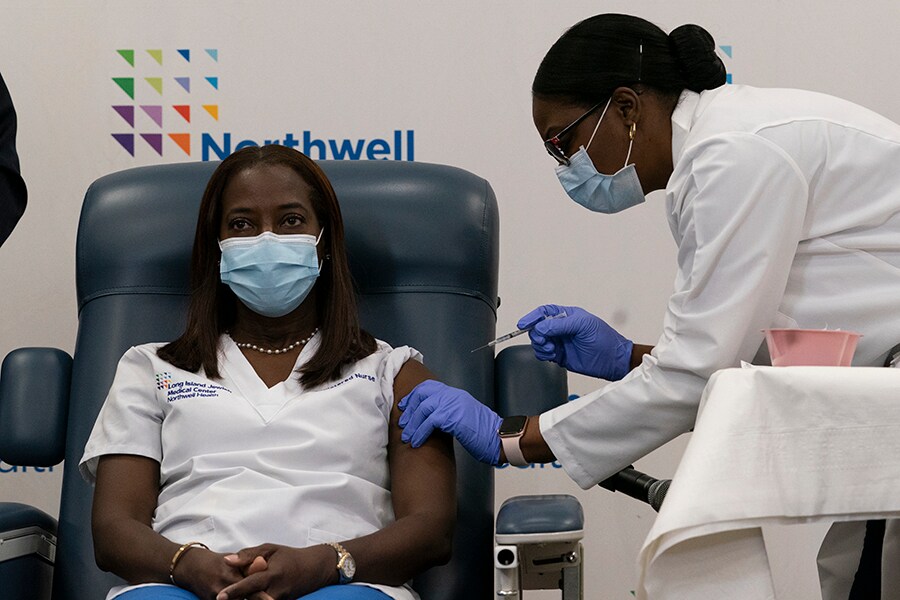I trust science: Critical care nurse who is first to get vaccine in US
Lindsay's vaccination at the medical center on the Queens-Long Island border was streamed into Gov. Andrew Cuomo's news conference and televised live on CNN


 NEW YORK, NY - DECEMBER 14: Sandra Lindsay, left, a nurse at Long Island Jewish Medical Center, is inoculated with the COVID-19 vaccine by Dr. Michelle Chester, December 14, 2020 in the Queens borough of New York City. The rollout of the Pfizer and BioNTech vaccine, the first to be approved by the Food and Drug Administration, ushers in the biggest vaccination effort in U.S. history.
NEW YORK, NY - DECEMBER 14: Sandra Lindsay, left, a nurse at Long Island Jewish Medical Center, is inoculated with the COVID-19 vaccine by Dr. Michelle Chester, December 14, 2020 in the Queens borough of New York City. The rollout of the Pfizer and BioNTech vaccine, the first to be approved by the Food and Drug Administration, ushers in the biggest vaccination effort in U.S. history.
Photo by Mark Lennihan /Getty Images[br]When officials at the Long Island Jewish Medical Center asked for staff volunteers to be among the first to take the coronavirus vaccine, Sandra Lindsay raised her hand.
Because of lingering skepticism about the vaccine, even among some on her own staff, Lindsay, the director of critical care nursing, said she wanted to lead by example — particularly as a Black woman who understands the legacy of unequal and racist medical treatment and experimentation on people of color.
“That was the goal today,” she said in a phone interview Monday. “Not to be the first one to take the vaccine, but to inspire people who look like me, who are skeptical in general about taking vaccines.”
Shortly after 9:20 a.m. on Monday, Lindsay, 52, became one of the most famous nurses in the United States when state officials said she was the first person in the country vaccinated for the coronavirus.
“It feels surreal,” she said. “It is a huge sense of relief for me, and hope.”
Growing up in Jamaica, before she immigrated to the United States 30 years ago, Lindsay helped take care of her grandmother, her primary caregiver, who had high blood pressure and diabetes. She was often asked by teachers what she wanted to be when she grew up. The answer was always: a nurse.
After moving to New York, she went to community college and then to Lehman College in the Bronx for her nursing degree.
She went to work at Lenox Hill Hospital in Manhattan and rose through the ranks until she became the director of critical care nursing at Long Island Jewish Medical Center, part of the Northwell Health network, in 2016. Still, nothing quite prepared her for her moment in the spotlight Monday.
Her vaccination at the medical center on the Queens-Long Island border was streamed into Gov. Andrew Cuomo’s news conference and televised live on CNN, on the first day of distribution across the country.
“This is a historic moment, potentially the beginning of the end,” Michael Dowling, president and chief executive of Northwell Health, said of the vaccination that could begin to bring under control a pandemic that has killed more than 35,000 New Yorkers in the state.
During the first wave of the pandemic, Lindsay led a team of hundreds of critical care nurses as the hospital coped with waves of extremely ill COVID-19 patients. Between March and May, the hospital opened six new intensive care units, expanding its intensive care capacity to about 150 patients at a time, more than triple its usual number.
Lindsay worked on the floor alongside her staff, helping to rotate patients on their beds, bathe them and get them what they needed, she recalled. The amount of suffering and illness she saw, while deploying and managing her own staff and dozens of travel nurses from around the country who helped assist, was “unbelievable,” she said.
“Some days, I don’t know how I got through it,” she said. “Some days I didn’t know how I got home, but I knew I had to rest and get ready to come back and do it again. Because I did not want to leave my team to do it alone.”
The second person to be vaccinated, Dr. Yves Duroseau, the chair of emergency medicine at Lenox Hill Hospital in Manhattan, also hoped to be a role model. As a front-line emergency medicine physician, he is at high risk. He wanted the staff of doctors, nurses and other health care workers that he oversees to follow his example, he said.
And as an American of Haitian descent, he said, he was eager to send a message that vaccination is safe. “I think we need to fear the COVID-19 virus more than we need to fear the vaccine,” Duroseau said.
Lindsay said she was not trying to make history but had volunteered in an effort to appeal directly to men and women of color who are skeptical of vaccinations in general. She mentioned the legacy of the Tuskegee study, which began in 1932 and withheld treatment from Black men with syphilis to analyze the effects.
She said that she wanted everyone to know that the coronavirus vaccine was critical in keeping all New Yorkers safe.
“It is rooted in science, I trust science, and the alternative and what I have seen and experienced is far worse,” she said. “So it’s important that everyone pulls together to take the vaccine, not only to protect themselves but also to protect everyone they will come into contact with.”
After getting the shot this morning, her arm hurt, “just like I got the flu shot,” she said. Otherwise, she felt fine.
First Published: Dec 15, 2020, 14:28
Subscribe Now